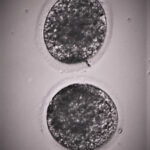Becker Equine offers specialized reproductive services, including stallion management and advanced assisted reproductive techniques.
Stallion Services
- Complete reproductive evaluations
- Semen evaluation
- Semen collection
- Semen processing and freezing
- Sex-sorted semen
- Cooled semen collection and shipping
Advanced Reproductive Techniques
- Oocyte collection (OPU) for ICSI (Intracytoplasmic Sperm Injection)
- Embryo transfer and freezing
Sexed Semen
Sex-sorted semen allows breeders to select the desired sex of the foal with greater than 95% accuracy. Because the sorting process reduces sperm viability and yield, ICSI is often the most effective technique for maximizing success with sexed semen.
What is ICSI?
ICSI involves injecting a single sperm directly into an oocyte in a laboratory setting. This technique is ideal for:
- Mares unable to carry a pregnancy
- High-value performance mares
- Stallions with low semen quality
- Limited or frozen semen doses
Success rates vary depending on mare and stallion factors, including age and semen quality. Our team will guide you through realistic expectations and individualized planning.



Source: genetechvet.com
